Manners, Customs, Clothing
 |
 |
 |
 |
 |
 |
 |
Thanks to Urbanity- II
Our First Duties to Society Are
the Duties to Our Parents
Manuel Carreño begins his chapter on Duties to Society with the important topic of Duties to Our Parents. He speaks in high elevated tones of the respect we owe our parents who have dedicated themselves to our full formation. This tenderness and goodness shown to us from our infancy should be repaid with filial respect.
It is not difficult to see how the Revolution has destroyed this first and vital relationship in society. Children openly mock, mimic, scorn and revile their parents. Parents, in turn, have played a large role in the loss of respect they receive. Fathers and mothers do not behave and dress with dignity, maintain authority in the home, or uphold Catholic principles and teach them to their children.
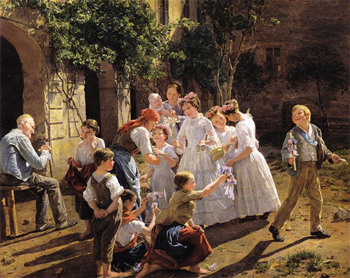 The family stability derives from Catholic principles that securely provides its members, particularly the children, with an ambience that develops a healthy individuality as well as a moral and spiritual strength.
The family stability derives from Catholic principles that securely provides its members, particularly the children, with an ambience that develops a healthy individuality as well as a moral and spiritual strength.
In his Manual of Urbanity and Good Manners, Carreño uses the elevated language of the Spanish Catholic world of the mid-19th century to describe the love and benevolence that parents show their children from the moment of their first existence. He then presents the duties of respect, honor and care the children have to their parents. He does this with calm and security, describing relations as if he could never imagine they could change.
His words can seem outmoded to our modern ears. The fault here, however, belongs to our times, not the past. We must begin to re-tune our ears, attitude and ways of being to correspond to those high ideals so that a new counter-revolutionary future can be made. The first place for this reconstruction to begin is, of course, in the family relationships.
Let Catholic parents aim to bestow to their children the constant and disinterested care and benevolence that Carreño describes as normal in his times. Let them also take a firm stand against vulgarity, immorality and blasphemy and present themselves at all times with dignity. Then, let children show the due respect and reverence owed to this loving, firm and honorable authority.
We turn now to Carreño's text, adapted somewhat to the American spirit and times, looking for a future that must build on our Catholic past.
Duties to the Family
The authors of our days, those who wiped away our first tears and bore with the miseries and inconveniences of our childhood, those who consecrated their efforts to the difficult task of our education and to cultivate our happiness, should be for us the most privileged and venerable beings that exist on earth.
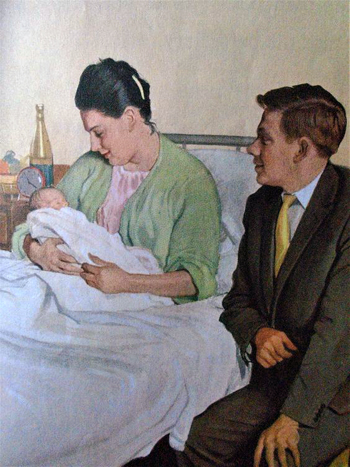 The love and sacrifices of a mother begin from the moment she carries us in her womb. How many physical sufferings and deprivations she endures to conserve the life of the child that nature has identified with her own being, and whom she already loves before her eyes have even seen him! During this time, the father cares for his wife with greater tenderness, protects her from dangers and anxieties that can beset her, accompanies her in her privations, comforts her in her sufferings, and joins her to guard the sweet fruit of their love.
The love and sacrifices of a mother begin from the moment she carries us in her womb. How many physical sufferings and deprivations she endures to conserve the life of the child that nature has identified with her own being, and whom she already loves before her eyes have even seen him! During this time, the father cares for his wife with greater tenderness, protects her from dangers and anxieties that can beset her, accompanies her in her privations, comforts her in her sufferings, and joins her to guard the sweet fruit of their love.
The child is finally born, at the cost of suffering, and his first sign of life is a cry, as if destiny were there to receive him in its arms and imprint the seal of suffering that must accompany him on his pilgrimage from the cradle to the grave.
His parents greet him with a kiss of blessing, lavish their caresses on him, protect his weakness and innocence. Here begins that exquisite care, consideration and sacrifice that triumph over all obstacles, vicissitudes and even at times ingratitude, and that end only with death.
How inexhaustible their patience must be to take care of us and seek our good, using firmness whenever necessary even from early childhood to keep us on the narrow path to Heaven. For they are the ones who imprint the first ideas on our soul, which serve as the basis for all subsequent knowledge and as the norm on the thorny path of life.
Their first care is to make us know God. They are the first ones to give us an idea of that infinitely great, powerful and good Being, before Whom the entire universe prostrates itself. It is they who teach us to love and adore Him and to pronounce His praises.
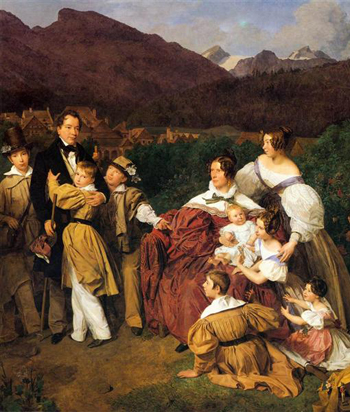 They spare no effort to provide us with education, offering from the home the sound foundation to discern what is right and wrong for that time when we enter the outside world. Then, after striving assiduously to feed, clothe, educate and form us and provide us with all kinds of innocent pleasures, they do not abandon in our mature age that sweet task of doing good for us.
They spare no effort to provide us with education, offering from the home the sound foundation to discern what is right and wrong for that time when we enter the outside world. Then, after striving assiduously to feed, clothe, educate and form us and provide us with all kinds of innocent pleasures, they do not abandon in our mature age that sweet task of doing good for us.
Our parents are at the same time our natural consultants, our loyal confidants. Egoism, envy, hypocrisy, and all other tributary passions of personal interest are excluded from their relations with us. They offer us the fruits of their experience and insights, and we confide willingly in them because we know that they are grounded firmly in the Catholic Faith and Morals they have transmitted to us.
The lessons they have received in the school of life, the discoveries they have made in their trades, sciences and arts, the useful secrets they possess, everything is for us, everything is transmitted to us. And if we see them still at an advanced age working actively and with dedication for the conservation and advancement of their properties, we know that what moves them is that this legacy is bequested to us for our future security and comfort.
The duties of children
If, then, the benefits we receive from our parents are so many and of such an elevated nature, what will be the extent of our duties towards them? Woe to him who, upon reaching the age of reason, has not already measured this debt with the noble and secure scale of gratitude!
For, if truth be told, one who has not been able to understand by that age what he owes to his parents will not understood what he owes to God either. And for these base and ungrateful souls there is no happiness possible either in this life or the next.
Filial piety is one of the sentiments that most honor and ennoble the human heart and that most disposes it to the practice of virtues. So convinced are we of this truth, that in order to judge the character and moral value of a person we would bring closer to us, we naturally investigate his behavior towards his parents. If we find that it is good, we feel a sympathy and a deep feeling of esteem and benevolence toward him. When a loving father considers a potential suitor for his daughter, one of his first concerns is to see how that young man treats his parents.
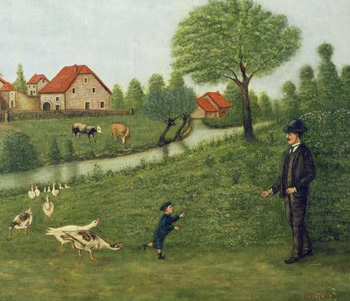 We must, therefore, rejoice in the fulfillment of the duties that divine law and nature itself have imposed on us towards our parents. To love, honor, respect and obey them, these are these great and sacred duties.
We must, therefore, rejoice in the fulfillment of the duties that divine law and nature itself have imposed on us towards our parents. To love, honor, respect and obey them, these are these great and sacred duties.
We should always testify our love and gratitude for our parents, but especially when they find themselves battered by misfortune, or when the weight of old age overwhelms them and reduces them to that state in which they need our assistance. Then, let us remember how much we owe them. Let us not hold back anything for them in their needs nor believe that we are too sore-tried in the inconveniences that their weary years cause us.
This pure love should naturally cause us to always show them honor, contributing by whatever means within our reach to their social esteem, and carefully hiding from strangers the faults and foibles to which, as human beings, they may be subject. For the glory of the son is the honor of the father.
Regarding our obedience, it should recognize no limits other than those of Faith, Morals and reason. In such lamentable cases we have the obligation to make our observations and objections to them in a kind and respectful way, and, sadly, at times even to refrain from contact with them. (See here, here, here and here)
Finally, included in the duties with which we are dealing is respect for our elders and teachers, and especially for those who have played a beneficial role in our formation. To them also is the debt of purest gratitude owed.
Two Examples: The Martins & St. John Bosco's mother
A Catholic home is a nest of harmony, that makes each individual feel his distinctness and, drawing from and building on the family's psychological and genetic heritage, gives him the possibility to develop a strong and unique personality.
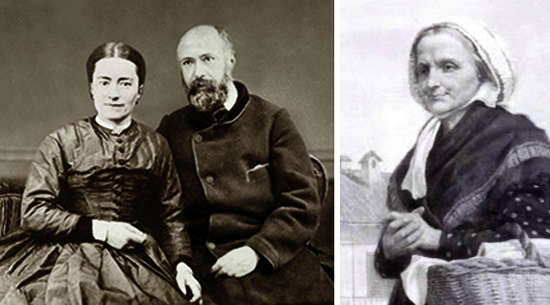 A beautiful example of such a home and family is that of Mr. and Mrs. Louis and Zelie Martin and their five daughters, Marie, Pauline, Leonie, Celine and Therese.
A beautiful example of such a home and family is that of Mr. and Mrs. Louis and Zelie Martin and their five daughters, Marie, Pauline, Leonie, Celine and Therese.
A deep calm and confidence in the designs of Divine Providence intensely marked the Martin family. The strong formation that the parents gave their children from their infancy was such that when her mother died, little Therese, who was only four-years-old, had the stability of person to realize herself as a great saint.
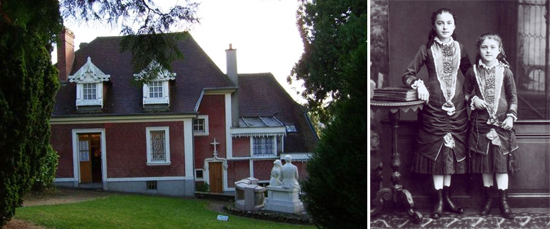 Another example comes from the humbler but no less Catholic home of St. John Bosco. His father died when he was just 21-months-old. His mother, Margarita Occhiena, took care of her own two children and the son from the first marriage of Don Bosco's father.
Another example comes from the humbler but no less Catholic home of St. John Bosco. His father died when he was just 21-months-old. His mother, Margarita Occhiena, took care of her own two children and the son from the first marriage of Don Bosco's father.
All the ingredients were there to form what is now called "a dysfunctional family": that is, a one parent home, children from two marriages, conflicts, fights, vices, etc.
What prevented it? Faith and the practice of virtue.
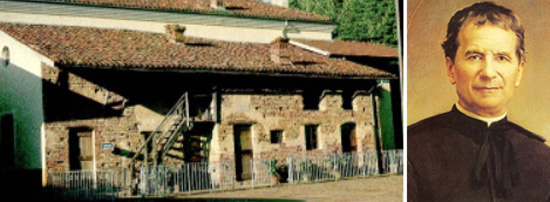 In a way similar to the case of St. Therese of the Child Jesus, Don Bosco's home was constantly nourished by the Catholic spirit. Mama Margharita, as she is called, provided a home with firm discipline, prayer and acceptance of what Divine Providence had arranged for them. They lived with dignity in their humble circumstances. The result: With the help of divine grace she formed the soul of a Saint renowned for his apostolic generosity and zeal who gives enormous glory to the Catholic world.
In a way similar to the case of St. Therese of the Child Jesus, Don Bosco's home was constantly nourished by the Catholic spirit. Mama Margharita, as she is called, provided a home with firm discipline, prayer and acceptance of what Divine Providence had arranged for them. They lived with dignity in their humble circumstances. The result: With the help of divine grace she formed the soul of a Saint renowned for his apostolic generosity and zeal who gives enormous glory to the Catholic world.
In two different cultures, in two different families, in two different social and economic settings, openness to grace produced virtuous results in what today we would consider difficult home situations. This is how the practice of virtue and good customs, combined with a profound Catholic ambience in the home, can overcome all material obstacles.
This demonstrates well the importance of proper relations in a family and of a strong Catholic conviviality in the home. It is not a matter of just the quantity of time that makes a good formation, there is the supernatural element to consider as well.
Continued
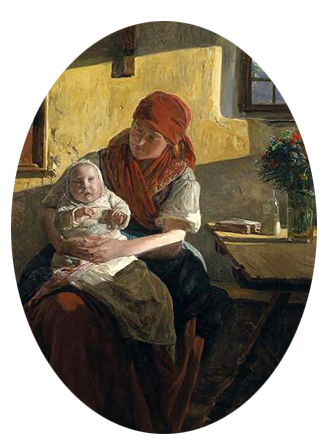

Posted March 23, 2022
It is not difficult to see how the Revolution has destroyed this first and vital relationship in society. Children openly mock, mimic, scorn and revile their parents. Parents, in turn, have played a large role in the loss of respect they receive. Fathers and mothers do not behave and dress with dignity, maintain authority in the home, or uphold Catholic principles and teach them to their children.

A scene of family conviviality in times past
In his Manual of Urbanity and Good Manners, Carreño uses the elevated language of the Spanish Catholic world of the mid-19th century to describe the love and benevolence that parents show their children from the moment of their first existence. He then presents the duties of respect, honor and care the children have to their parents. He does this with calm and security, describing relations as if he could never imagine they could change.
His words can seem outmoded to our modern ears. The fault here, however, belongs to our times, not the past. We must begin to re-tune our ears, attitude and ways of being to correspond to those high ideals so that a new counter-revolutionary future can be made. The first place for this reconstruction to begin is, of course, in the family relationships.
Let Catholic parents aim to bestow to their children the constant and disinterested care and benevolence that Carreño describes as normal in his times. Let them also take a firm stand against vulgarity, immorality and blasphemy and present themselves at all times with dignity. Then, let children show the due respect and reverence owed to this loving, firm and honorable authority.
We turn now to Carreño's text, adapted somewhat to the American spirit and times, looking for a future that must build on our Catholic past.
Duties to the Family
The authors of our days, those who wiped away our first tears and bore with the miseries and inconveniences of our childhood, those who consecrated their efforts to the difficult task of our education and to cultivate our happiness, should be for us the most privileged and venerable beings that exist on earth.

A mother's tender love & father's protection begin before the child is born
The child is finally born, at the cost of suffering, and his first sign of life is a cry, as if destiny were there to receive him in its arms and imprint the seal of suffering that must accompany him on his pilgrimage from the cradle to the grave.
His parents greet him with a kiss of blessing, lavish their caresses on him, protect his weakness and innocence. Here begins that exquisite care, consideration and sacrifice that triumph over all obstacles, vicissitudes and even at times ingratitude, and that end only with death.
How inexhaustible their patience must be to take care of us and seek our good, using firmness whenever necessary even from early childhood to keep us on the narrow path to Heaven. For they are the ones who imprint the first ideas on our soul, which serve as the basis for all subsequent knowledge and as the norm on the thorny path of life.
Their first care is to make us know God. They are the first ones to give us an idea of that infinitely great, powerful and good Being, before Whom the entire universe prostrates itself. It is they who teach us to love and adore Him and to pronounce His praises.

The good order & dignified dress of the parents inspired the children to respect & imitate them
Our parents are at the same time our natural consultants, our loyal confidants. Egoism, envy, hypocrisy, and all other tributary passions of personal interest are excluded from their relations with us. They offer us the fruits of their experience and insights, and we confide willingly in them because we know that they are grounded firmly in the Catholic Faith and Morals they have transmitted to us.
The lessons they have received in the school of life, the discoveries they have made in their trades, sciences and arts, the useful secrets they possess, everything is for us, everything is transmitted to us. And if we see them still at an advanced age working actively and with dedication for the conservation and advancement of their properties, we know that what moves them is that this legacy is bequested to us for our future security and comfort.
The duties of children
If, then, the benefits we receive from our parents are so many and of such an elevated nature, what will be the extent of our duties towards them? Woe to him who, upon reaching the age of reason, has not already measured this debt with the noble and secure scale of gratitude!
For, if truth be told, one who has not been able to understand by that age what he owes to his parents will not understood what he owes to God either. And for these base and ungrateful souls there is no happiness possible either in this life or the next.
Filial piety is one of the sentiments that most honor and ennoble the human heart and that most disposes it to the practice of virtues. So convinced are we of this truth, that in order to judge the character and moral value of a person we would bring closer to us, we naturally investigate his behavior towards his parents. If we find that it is good, we feel a sympathy and a deep feeling of esteem and benevolence toward him. When a loving father considers a potential suitor for his daughter, one of his first concerns is to see how that young man treats his parents.

From infancy, a son learns to obey
& respect his father
We should always testify our love and gratitude for our parents, but especially when they find themselves battered by misfortune, or when the weight of old age overwhelms them and reduces them to that state in which they need our assistance. Then, let us remember how much we owe them. Let us not hold back anything for them in their needs nor believe that we are too sore-tried in the inconveniences that their weary years cause us.
This pure love should naturally cause us to always show them honor, contributing by whatever means within our reach to their social esteem, and carefully hiding from strangers the faults and foibles to which, as human beings, they may be subject. For the glory of the son is the honor of the father.
Regarding our obedience, it should recognize no limits other than those of Faith, Morals and reason. In such lamentable cases we have the obligation to make our observations and objections to them in a kind and respectful way, and, sadly, at times even to refrain from contact with them. (See here, here, here and here)
Finally, included in the duties with which we are dealing is respect for our elders and teachers, and especially for those who have played a beneficial role in our formation. To them also is the debt of purest gratitude owed.
Two Examples: The Martins & St. John Bosco's mother
A Catholic home is a nest of harmony, that makes each individual feel his distinctness and, drawing from and building on the family's psychological and genetic heritage, gives him the possibility to develop a strong and unique personality.

Parents from two social levels who formed their children well:
The Martins & Mama Margharita
A deep calm and confidence in the designs of Divine Providence intensely marked the Martin family. The strong formation that the parents gave their children from their infancy was such that when her mother died, little Therese, who was only four-years-old, had the stability of person to realize herself as a great saint.

La Buissenet, the home of St. Therese, pictured with her sister Celine.
All is calm, stable & ordered
All the ingredients were there to form what is now called "a dysfunctional family": that is, a one parent home, children from two marriages, conflicts, fights, vices, etc.
What prevented it? Faith and the practice of virtue.

The simple peasant home of Dom Bosco
In two different cultures, in two different families, in two different social and economic settings, openness to grace produced virtuous results in what today we would consider difficult home situations. This is how the practice of virtue and good customs, combined with a profound Catholic ambience in the home, can overcome all material obstacles.
This demonstrates well the importance of proper relations in a family and of a strong Catholic conviviality in the home. It is not a matter of just the quantity of time that makes a good formation, there is the supernatural element to consider as well.
Continued


Posted March 23, 2022
______________________
______________________








